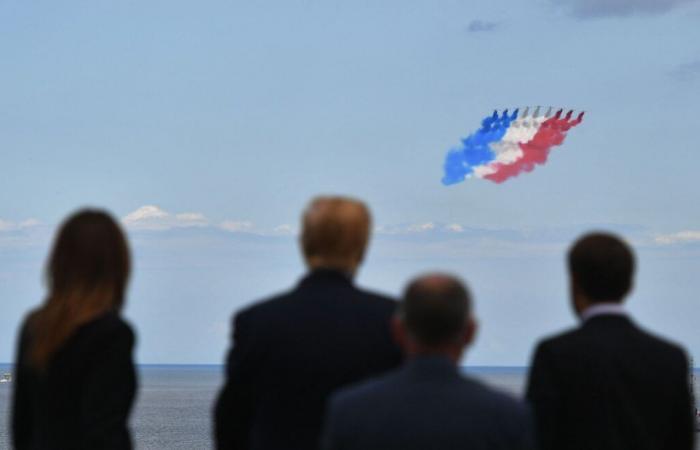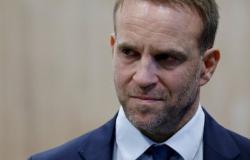Everything started well. Both men had nothing but positive words for each other. They even took each other’s hands and patted each other on the back. It was, it was said, “ a very special relationship “. Attending the July 14 celebrations in 2017, Donald Trump was even impressed by the military parade, which he wanted to import to the United States. It was after that that everything went wrong. It was enough for him to withdraw from the Paris Agreement and tear up the Vienna Agreement on Iranian nuclear power for everything to come to a head. Referring to trade disagreements, the American president will even go so far as to ridicule Emmanuel Macron’s French accent and, with his usual tact, accuse him of “licking the c…” of China!
Eight years later, the French president was still one of the first European heads of state to congratulate the 47e President of the United States of his victory, taking care to consult his German counterpart beforehand. The two men even had a telephone conversation, discussing their intention “to work for the return of peace and stability”. However, Emmanuel Macron has few illusions. “The United States of America has two priorities: the United States of America first, and that is legitimate, and then the Chinese question,” he warned during his speech at the Sorbonne last April. “The European question is not a geopolitical priority for the years and decades to come,” he concluded.
A certain panic
The French president, however, wants to believe that this election will be the shock that will allow the European Union to give itself “strategic autonomy” and take charge of itself. It is time “for Europe to grow and believe in its own strength,” Polish Prime Minister Donald Tusk also wrote on the social network
But nothing is less certain. Beyond the diplomatic formulas, the election of Donald Trump is not far from causing a certain panic in Europe. Anticipating the election of Donald Trump, former European Commissioner Thierry Breton estimated that “all European institutions are not prepared for what will happen on November 5.” And the European site Euroactiv asks: “Who in Europe can look Donald Trump eye to eye? »
It is an open secret that this election comes at the worst time for Europe. Will the United States decide to abandon Ukraine and NATO and launch a trade war at a time when France is drowning in debt and Germany is sinking into a political crisis coupled with a recession? “Expect Europeans to rush in scattered order to Mar-a-Lago to demand privileged treatment compared to their neighbors,” former French ambassador to Washington Gérard Araud wrote on X.
During the campaign, Donald Trump claimed to be able to make peace in 24 hours in Ukraine. A month ago, Volodymyr Zelensky met him in New York. In European circles, no one believes that the United States will abandon support for Ukraine overnight, at a time when 10,000 North Korean soldiers are deployed on the Russian front. In any case, it is hard to imagine how the European Union could be the only one to support Ukraine.
According to the daily columnist L’Opinion Pascal Airault, the candidate tipped to lead American diplomacy, the former United States ambassador to Berlin Richard Grenell, is known to be a supporter of “strong diplomacy”. This could impose autonomous zones on Ukraine and postpone Ukraine’s entry into NATO indefinitely. Moreover, it did not take 24 hours for Vladimir Putin to declare himself ready to resume contact with Washington.
Such a settlement risks sowing discord in Europe, where Poland and France say they want Russia to be defeated, while Slovakia, Hungary and Germany lean towards a compromise. All this in a context where the European Union is increasingly struggling to support the war effort, of which it has become the main contributor. The telephone number for Europe is Viktor Orbán, Donald Trump is said to have declared, according to Thierry Breton. An allusion to this joke that we attribute to Henry Kissinger: “Europe, what telephone number? »
What European defense?
There is no doubt that Trump will demand that the Europeans increase their contribution to NATO, as he did during his first term. Here too we do not expect a withdrawal of the United States, but a new standoff. Until recently, only three NATO members spent at least 2% of their GDP on defense. Today there are 23 out of 32. This is particularly true for European countries, like Germany, which have made a considerable effort.
Hence the French dream of an autonomous European defense. This week, a report from the International Institute for Strategic Studies noted that, despite this effort, European countries “continue to rely on the United States to varying degrees in all military domains.” Not to mention that, when a country like Germany or Poland undertakes to increase its contribution, it does so by mainly purchasing American tanks and planes. “It seems quite unlikely to me that the election of Donald Trump will act as an electric shock likely to create a federalist response in Europe or even a simple resumption of the Franco-German axis. Experience shows us that we are not capable of it,” said a specialist on the Atlantico website who prefers to remain anonymous.
If European countries are reluctant to increase their military spending even further, Trump “could, for example, threaten Europe with customs duties to force it to increase its defense spending,” declared in The World Natixis agency economist Christopher Hodge. A supporter of “tariff reciprocity”, Trump defended during the campaign a universal tariff of 10% or 20%. However, after China, it is Germany that the president has in his sights because of its enormous trade surplus with the United States. According to the German Ifo institute, if Donald Trump carried out his threats, German exports to the United States could fall by almost 15%. As for the automobile industry, already in crisis, it could hardly recover.
“The Franco-German couple cannot do anything in the face of Trump with a government [allemand] terminally ill,” declared Paul Maurice, specialist in German domestic politics at the French Institute of International Relations. And a French government without a real majority, one might add. This is what makes many say that, regardless of the “change of era” and his desire for “European sovereignty” proclaimed after the invasion of Ukraine, Olaf Scholz will hasten to negotiate a bilateral agreement. in Washington to maintain America’s good graces.
No energy sovereignty
For Donald Trump, Europe is first and foremost a market, it is said in the corridors of the European Commission, which is preparing, if not for a trade war, for sharp clashes. At the heart of these, energy could become the sinews of war. With his drilling at all costs, the president-elect wants to make the United States the leading energy power in the world. A formidable weapon against China, which is seriously lacking in energy resources. However, Europe is also largely dependent on the United States in this area, particularly for natural gas, since Russian supplies have dried up. However, its energy policy has not changed while many companies filing for bankruptcy do not hesitate to blame the prohibitive energy costs. Brussels even has the luxury of appointing an energy commissioner, Dane Jørgensen, who is fiercely anti-nuclear.
On several occasions, Donald Trump has shown that he does not hold Germany in his heart and he looks down on France. In this context, the president is expected to address new interlocutors. We know the chemistry he has with Viktor Orbán. He is the only one, with the Slovak president, Robert Fico, to have openly supported his campaign. To Scholz and Macron, he could also prefer Giorgia Meloni, with whom he has ideological proximity. While Meloni has not officially supported her campaign, she cultivates a close relationship with Elon Musk, who would be expected to play an important role in the new government. The billionaire was the guest of honor at Fratelli d’Italia in 2023 and it was he who personally presented the president of the council with the Global Citizen Award, awarded by the think tank Atlantic Council.
Enough to overshadow Olaf Scholz and Emmanuel Macron, two leaders who are in trouble. The first is desperately seeking a new coalition and at risk of not being re-elected. The second, without a parliamentary majority and must absolutely leave the presidency in two years.






